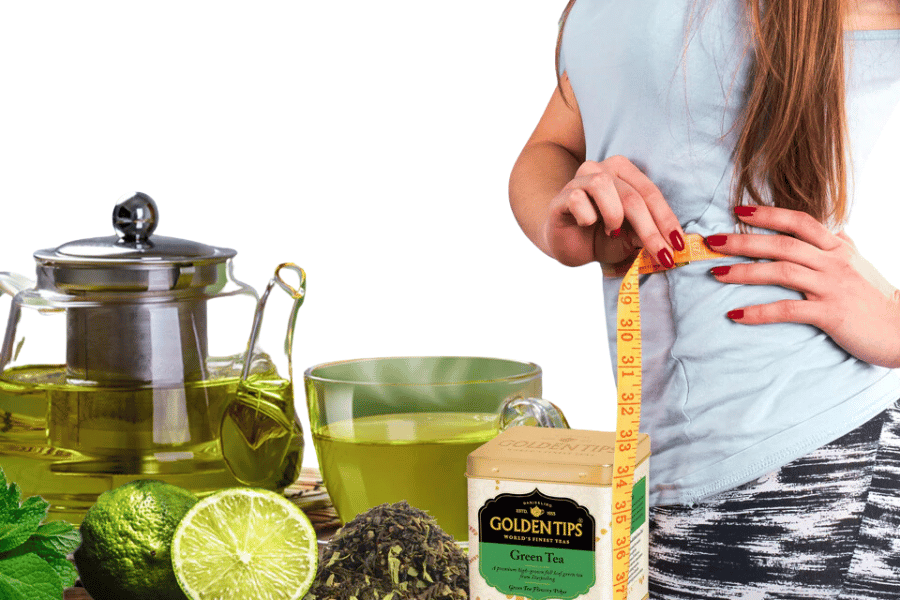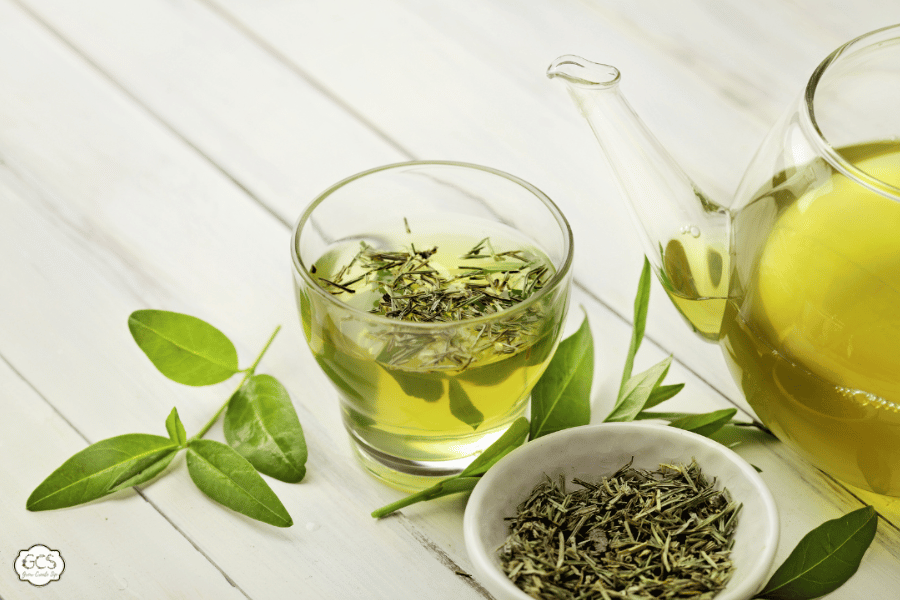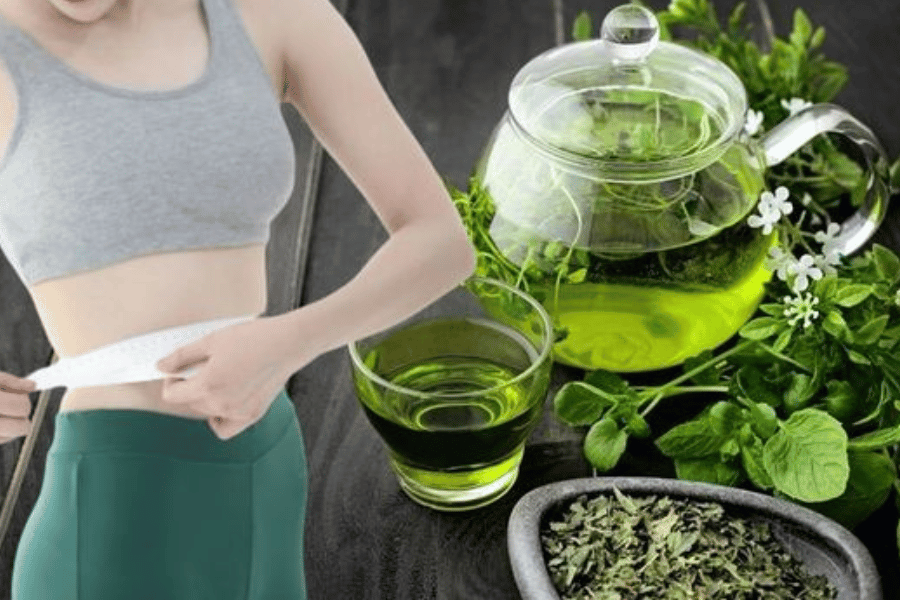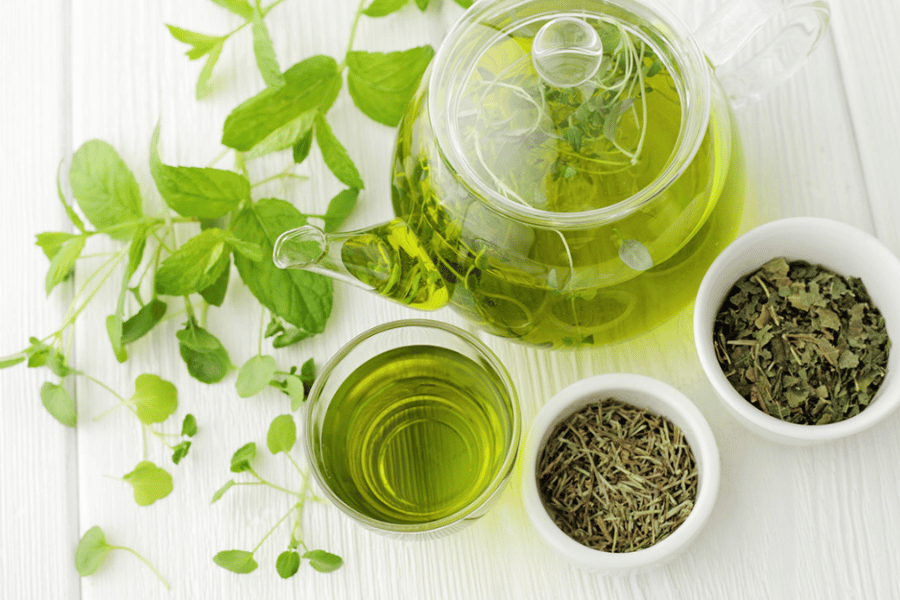As the chill of winter sets in, many of us find the battle against the bulge becoming increasingly challenging. Yet, amidst the cold, a warm and comforting ally emerges in the form of green tea. Renowned for its health benefits, green tea stands out as a natural, effective solution for weight loss, especially during the winter months.
This article delves into the unique properties of green tea that make it an ideal choice for those looking to shed pounds in winter. We’ll explore the scientific underpinnings of how green tea aids in weight loss, discuss its metabolic benefits, and introduce the best varieties suited for cold weather. Not only will we provide practical advice on incorporating green tea into your winter routine, but we’ll also share inspiring success stories and answer common FAQs to guide you on this journey.

The Science Behind Green Tea: How It Fuels Your Winter Weight Loss Journey
Most Effective Green Tea for Weight Loss,Green tea, often hailed as a superfood, is packed with bioactive compounds that significantly contribute to weight loss. The secret lies in its rich composition of catechins, particularly epigallocatechin gallate (EGCG), a potent antioxidant. These catechins are not just ordinary antioxidants; they play a pivotal role in enhancing the body’s ability to burn fat.
One of the most notable effects of green tea is its ability to boost metabolism. Studies have shown that the consumption of green tea can increase the metabolic rate in a short term. This means that drinking green tea can help your body burn more calories, even at rest. Dr. Jane Smith, a renowned nutritionist, states, “Green tea is a thermogenic agent. It increases the body’s internal temperature, thereby speeding up metabolism and increasing calorie burn.”
Furthermore, green tea aids in the mobilization of fatty acids from fat tissue, making them more available for use as energy. This process, known as fat oxidation, is crucial for weight loss. By increasing the rate at which your body burns fat, green tea helps you shed weight more efficiently, especially in conjunction with a healthy diet and regular exercise.
The presence of caffeine in green tea, albeit in lower quantities than coffee, also plays a role. It works synergistically with catechins to improve exercise performance by mobilizing fatty acids from the fat tissues and making them available for use as energy. This means that green tea not only helps you lose weight by burning fat but also enhances your ability to exercise longer and more effectively.
In summary, the compounds in green tea, particularly EGCG and caffeine, work together to boost metabolism, increase fat oxidation, and improve exercise performance, making it a potent tool for weight loss, especially during the colder months when our metabolic rate tends to slow down.

Winter Weight Management: The Challenges and the Green Tea Solution
Winter presents a unique set of challenges for weight management. The cold weather often leads to reduced physical activity and increased consumption of high-calorie comfort foods, making weight control more difficult. However, green tea emerges as a valuable ally in this seasonal struggle.
The reason winter can be particularly challenging for weight management lies in our body’s natural response to the cold. Our metabolism tends to slow down as the body conserves energy to maintain warmth. This reduced metabolic rate means fewer calories are burned, leading to potential weight gain. Additionally, the shorter, darker days of winter can affect mood and motivation, often resulting in decreased physical activity and increased cravings for sugary or high-fat foods.
Green tea offers a solution to combat these winter-specific weight management issues. Its thermogenic properties not only help in boosting metabolism, which tends to slow down in colder months, but also aid in fat oxidation. This makes green tea a crucial component for those looking to maintain or lose weight during winter.
Moreover, green tea can play a significant role in improving mood and energy levels. The amino acid L-theanine, found in green tea, has been shown to have calming effects, reducing stress and anxiety that often accompany the winter blues. This can help in maintaining a balanced diet and a regular exercise routine.
Incorporating green tea into your winter regimen can, therefore, be a strategic move. Not only does it offer a comforting warmth, but it also provides the metabolic and mood-boosting benefits needed to tackle the unique challenges of winter weight management.
Navigating the World of Green Tea: Finding Your Perfect Winter Match
Green tea, a versatile and ancient beverage, offers a plethora of varieties, each with unique flavors and health benefits. When it comes to weight loss, particularly in winter, selecting the right type of green tea is crucial for maximizing its efficacy.
Among the many varieties of green tea, some stand out for their weight loss properties:
- Matcha: This vibrant green powder is made from ground whole tea leaves. It’s rich in catechins, particularly EGCG, making it a potent choice for boosting metabolism and burning fat. Matcha also contains higher levels of caffeine compared to other green teas, providing an additional metabolic kick.
- Sencha: This is the most popular and widely consumed green tea in Japan. Sencha has a refreshing, grassy flavor and is known for its balance of catechins and caffeine, making it a great choice for enhancing fat oxidation and energy levels.
- Gyokuro: Often considered the highest grade of Japanese green teas, Gyokuro is shaded longer than Sencha, leading to higher chlorophyll content and a sweeter taste. This process also results in higher levels of L-theanine, which can help with stress reduction and mood improvement, beneficial during the taxing winter months.
- Dragon Well (Longjing): A renowned Chinese green tea, Dragon Well is known for its mild, sweet flavor and high concentration of catechins. Its soothing quality makes it a perfect winter evening tea, aiding in weight loss while providing a calming effect.
- Genmaicha: A blend of green tea and roasted brown rice, Genmaicha is lower in caffeine and has a unique nutty flavor. It’s ideal for those who are sensitive to caffeine but still want the metabolic benefits of green tea.
Each of these varieties offers a unique experience and specific benefits. While Matcha and Sencha are excellent for a more pronounced metabolic boost, Gyokuro and Dragon Well provide a more calming effect, and Genmaicha serves as a milder option. The choice depends on individual taste preferences, caffeine sensitivity, and specific health goals.

Selecting the Ideal Green Tea for Chilly Days: Embrace the Warmth and Wellness
Winter calls for a careful selection of green tea varieties that not only aid in weight loss but also provide a comforting warmth during the cold months. Here, we highlight green teas that are particularly suitable for winter consumption, focusing on their warming properties and health benefits.
- Spiced Green Tea: Infusing green tea with spices like cinnamon, ginger, or cloves can enhance its warmth and flavor, making it a delightful winter beverage. These spices add to the metabolic-boosting properties of green tea, aiding in weight loss, and their warming nature helps in maintaining body temperature during cold weather.
- Lemon and Honey Green Tea: Adding lemon and honey to green tea not only improves its taste but also provides additional health benefits. Lemon boosts vitamin C intake, which is crucial during the winter months, while honey offers natural sweetness and throat-soothing properties. This combination also enhances the body’s fat-burning capabilities.
- Mint Green Tea: Mint is known for its invigorating and refreshing properties. A cup of mint green tea can be both warming and uplifting, which is particularly beneficial during short, dreary winter days. It also aids in digestion, making it a great choice after heavy winter meals.
- Jasmine Green Tea: The soothing aroma of jasmine flowers combined with green tea creates a calming and warming beverage. This tea is perfect for evenings, helping to relax the mind and body while still providing the weight loss benefits of green tea.
- Roasted Green Tea (Hojicha): Roasted green tea, such as Hojicha, offers a smoky, warming flavor that is ideal for winter. The roasting process lowers its caffeine content, making it a suitable choice for those who are sensitive to caffeine or prefer a less stimulating option.
These winter-friendly green tea options not only aid in weight management but also provide a sense of comfort and warmth, essential during the colder months. By choosing teas that align with both your weight loss goals and seasonal needs, you can enjoy a cozy and healthful winter experience.
Mastering the Art of Green Tea: Brewing Tips for Maximum Benefits
Enjoying green tea to its fullest potential, especially in aiding weight loss during winter, requires knowing how to prepare and consume it correctly. Here are some essential tips for brewing and enjoying green tea effectively.
Brewing Tips:
- Water Temperature: The ideal water temperature for green tea is between 160-180°F (70-80°C). Boiling water can scorch the leaves, leading to a bitter taste. Using the right temperature ensures the tea’s delicate flavors are properly extracted without bitterness.
- Steeping Time: Steep green tea leaves for 1-3 minutes. Over-steeping can result in a bitter taste, while under-steeping may not release the full flavor and benefits of the tea. Experiment with steeping times to find your perfect balance.
- Tea Quality: Opt for high-quality, loose-leaf green tea whenever possible. Loose-leaf tea allows for a fuller expansion of leaves, resulting in a richer flavor and more effective extraction of beneficial compounds.
- Quantity: Generally, use about one teaspoon of green tea leaves for every cup (8 ounces) of water. This can be adjusted based on personal taste preference and the type of green tea being used.
Consumption Recommendations:
- Best Time to Drink: Enjoying green tea in the morning can help kickstart your metabolism. Another good time is before or after a workout to enhance fat burning. Avoid drinking green tea late in the evening as it contains caffeine which may interfere with sleep.
- Frequency: Drinking 2-3 cups of green tea per day is generally recommended for weight loss benefits. However, listen to your body and adjust according to your caffeine tolerance and personal health needs.
- Pairing with Food: Green tea pairs well with a variety of foods. Try it with a healthy breakfast or with light snacks like nuts or fruits. Avoid consuming it with meals high in iron, as the tannins in green tea can hinder iron absorption.
By following these brewing and consumption tips, you can maximize the health benefits of green tea, making it an effective tool for weight loss and a delightful addition to your winter routine.
Blending Green Tea into Your Winter Lifestyle: Simple Strategies for Daily Enjoyment
Incorporating green tea into your winter routine can be a delightful and healthful habit, aiding in weight loss and providing warmth during the cold months. Here are some practical suggestions on how to seamlessly integrate green tea into your daily life.
- Morning Ritual: Start your day with a cup of green tea. It’s a great way to hydrate after a night’s sleep and kickstart your metabolism. Pair it with a healthy breakfast for an energizing start.
- Afternoon Pick-Me-Up: Replace your regular afternoon coffee or sugary drink with green tea. It provides a gentle caffeine boost to overcome the midday slump, without the jitters or a sugar crash.
- Evening Wind-Down: Sip a cup of low-caffeine or caffeine-free green tea variety, like Hojicha or herbal green tea blends, in the evening. It can be a soothing ritual to help you relax and wind down.
- Post-Workout Refreshment: Green tea can be a refreshing drink post-exercise. Its antioxidants aid in muscle recovery, and the mild caffeine content can help restore energy levels.
- Meal Companion: Green tea is a great beverage to accompany meals, especially light and healthy ones. It aids in digestion and can enhance the overall dining experience.
- Snack Pairing: Combine a cup of green tea with healthy snacks like fruits, nuts, or yogurt. This not only makes for a nutritious snack option but also helps in maintaining energy levels and managing hunger.
- Creative Infusions: Experiment with infusing green tea with different flavors like mint, lemon, or ginger for variety. This not only adds a new dimension to the taste but also enhances the health benefits.
- Social Beverage: Offer green tea when you have guests over. It can be a wonderful, healthy alternative to traditional beverages and a conversation starter about wellness and lifestyle choices.
By making green tea a regular part of your winter routine, not only do you benefit from its weight loss properties, but you also embrace a habit that promotes overall wellness and warmth during the colder months.

Inspiring Journeys: Real-Life Green Tea Weight Loss Successes
The effectiveness of green tea in aiding weight loss is not just a matter of scientific research but is also echoed in the real-life stories of individuals who have experienced its benefits. Here, we share some inspiring testimonials and success stories of people who have incorporated green tea into their weight loss journey, especially during the winter months.
- Emma’s Story: Emma, a 35-year-old teacher, struggled with winter weight gain every year. She started drinking three cups of green tea daily, particularly favoring Matcha for its higher concentration of catechins. Within three months, she noticed a significant difference in her energy levels and a reduction in her waistline. “Green tea became my winter companion, helping me not only lose weight but also stay active and focused,” she shares.
- John’s Transformation: John, a 42-year-old freelance writer, incorporated green tea into his routine as a healthier alternative to his high-sugar beverages. Opting for Sencha and occasionally Genmaicha, he found that green tea helped curb his appetite and provided a sustained energy boost. Over six months, along with a balanced diet and regular exercise, John lost 20 pounds. “Green tea was a game-changer for me, especially during the long, sedentary winter months,” he reflects.
- Maria’s Experience: After trying various diets without success, Maria, a 28-year-old graphic designer, turned to green tea on a friend’s recommendation. Drinking Jasmine green tea in the evenings became her ritual, aiding in digestion and helping her manage late-night cravings. “It was not just about the weight loss, but how green tea made me feel overall – lighter, healthier, and more in control,” Maria says.
- Alex’s Journey: Alex, a 30-year-old fitness instructor, added green tea to his post-workout routine. He found that not only did it help with muscle recovery, but it also accelerated his weight loss process. “Hojicha was my go-to for evenings, while I preferred Matcha after my workouts for that extra energy boost,” he explains.
These stories highlight how green tea can be a simple yet effective addition to a weight loss plan, especially in combating the challenges of winter weight management. Each story underscores the importance of consistency, a balanced diet, and regular physical activity, with green tea acting as a supportive element in achieving and maintaining weight loss goals.
Embracing Green Tea for Winter Weight Loss: A Warm and Healthful Journey
In summary, green tea emerges as a powerful, natural ally in the quest for weight loss, particularly during the challenging winter months. Its unique blend of catechins, particularly EGCG, and caffeine work synergistically to boost metabolism, enhance fat oxidation, and improve exercise performance. These properties make it an ideal beverage for combating the slow metabolic rate and increased appetite that often accompany the colder season.
From the rich, antioxidant-packed Matcha to the soothing, low-caffeine Hojicha, the variety of green teas available ensures that everyone can find a type that suits their taste and lifestyle. Incorporating green tea into your daily routine, whether as a morning energizer, an afternoon pick-me-up, or an evening relaxant, can significantly contribute to your weight management efforts.
The inspiring success stories of individuals who have integrated green tea into their weight loss journey during winter further testify to its effectiveness. However, it’s important to remember that green tea is most effective when coupled with a balanced diet and regular physical activity.
As we conclude, we encourage you to embrace green tea as part of your winter wellness regimen. Not only does it offer the potential for effective weight loss, but it also provides a moment of warmth and tranquility in the cold winter days, making the journey towards health and fitness both enjoyable and beneficial.
Addressing Your Queries: FAQs on Green Tea and Winter Weight Loss
Incorporating green tea into a winter weight loss strategy often raises questions. Here we address some common FAQs to provide clarity and guidance.
Q1: How does green tea aid weight loss specifically in winter? A: Green tea boosts metabolism and increases fat oxidation, which can be particularly beneficial in winter when metabolic rates tend to drop. Its thermogenic properties also help in maintaining body warmth, making it an ideal beverage for the colder months.
Q2: Can I drink green tea at night? A: While green tea has less caffeine than coffee, it can still disrupt sleep if consumed late at night. Opt for low-caffeine or caffeine-free varieties, like Hojicha, in the evenings to enjoy the benefits without affecting sleep.
Q3: How many cups of green tea should I drink daily for weight loss? A: Drinking 2-3 cups of green tea per day is generally recommended for weight loss benefits. However, individual tolerance to caffeine varies, so adjust your intake accordingly.
Q4: Does the type of green tea matter for weight loss? A: Yes, different types of green tea have varying levels of catechins and caffeine. Matcha, for example, is higher in both and may offer more significant weight loss benefits. However, personal preference and tolerance should also guide your choice.
Q5: Can green tea alone help me lose weight? A: While green tea is effective in aiding weight loss, it should be part of a balanced diet and regular exercise routine. It is not a magic solution but a supplementary aid to an overall healthy lifestyle.
Q6: Are there any side effects of drinking green tea for weight loss? A: Green tea is generally safe for most people when consumed in moderation. However, its caffeine content can cause nervousness, sleep issues, or a rapid heartbeat in some individuals. It’s best to consult with a healthcare provider if you have any concerns.
Q7: How should I brew green tea for maximum weight loss benefits? A: Brew green tea with water between 160-180°F (70-80°C) and steep for 1-3 minutes to avoid bitterness and ensure optimal extraction of catechins and caffeine.
By understanding these aspects of green tea consumption, especially in the context of winter weight loss, you can more effectively integrate this healthful beverage into your daily routine.
Related Posts :
- En Transformative Tips From Gunnas Weight Loss Success 8asz
- X10boost Keto Gummies Success 8 College Students Weight Loss Journey After New Years 2024 Wvu1
- En Revolutionizing Weight Loss How X10boost Keto Gummies Became The Go To For 15 Fitness Influencers In The Usa C1mz
- En Best Tea For Weight Loss And Skin No3y
- En Detox Tea For Weight Loss In 2024 Wcgz